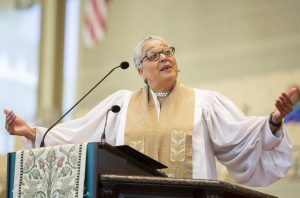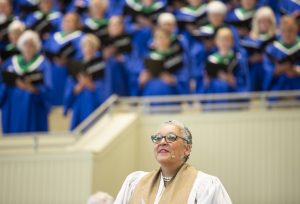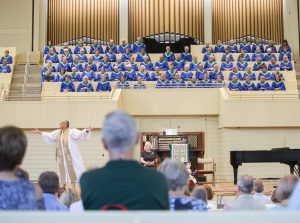
“What would you do if God came near and asked, ‘What’s that in your hand?’ That was the predicament of Moses at Mount Horeb,” said the Rev. Zina Jacque at the 10:45 a.m. Service of Worship and Sermon Sunday in the Amphitheater. Her sermon title was “What’s That in Your Hand?” and the Scripture readings were Exodus 4:1-5 and Hebrews 13:20-21.
Moses, Jacque said, was having a banner day. He had encountered God in a burning bush near Mount Horeb and God had an assignment for him. God wanted Moses to go back to Egypt and tell Pharaoh to let the Israelites go. God would meet them at Mount Horeb and “they would have a three-day revival in the desert.”
Even though God predicted a sure and happy end, Moses had questions: “What if they don’t believe me? What if they say I have been out in the sun with the sheep too long?” Jacque said.
Moses had reason to be afraid. Pharaoh was angry with him for killing an Egyptian and said he would kill Moses. Moses knew the Israelites would not believe him and felt like he was pressing his luck to go back.
“God stepped in with power and majesty and asked, ‘What is that in your hand?’ ” Jacque said.
All Moses had was his staff, a piece of a tree branch that was an implement of his trade.
“God asked ‘what’s that in your hand’ not what is in your bank account, not what clothes did he have in his closet at his father-in-law Jethro’s house, not what Moses knew,” she said.
God knew that what Moses had in his hand was all he needed, yet God seemed to be asking the impossible of him.
Moses did not think he was the right person for the task.
“He had not always been with his people,” Jacque said. “When he, as they say in the vernacular, ‘got woke,’ he killed an Egyptian and ran. He married a Midianite. In other words, he was not a good Hebrew for the assignment.”

MHARI SHAW/STAFF PHOTOGRAPHER
God, however, thought Moses was in a position to use every one of his life experiences for the assignment.
“God knew that Moses had all that he needed to complete the assignment, but Moses had been given free will,” she said. “It was up to him to decide if he would.”
Beloved of God, Jacque called the congregation, “we are in exactly the same position today. You and I have everything we need to bring about justice and righteousness. Our regular everyday stuff is just like Moses’ stuff.”
Most of us are in the same position as Moses, she told the congregation, raised in spaces of ease. That description may not apply to everyone, but “if you are here at Chautauqua, it describes you,” she said.
Moses knew that the Israelites were his kith and kin, but he could close his palace windows and drown out the sounds of their suffering.
“We can do the same thing to children without parents, without hope and apparently without soap,” Jacque said. “Making bricks out of straw is like making minimum wage without benefits. We can forget to be woke.”
God did not upbraid Moses for his reluctance; instead, he kept asking Moses: “What’s that in your hand?”
“Everyone here has a story that will open life for someone else,” Jacque said. “Someone has the location to speak truth to power. The people in this room have agency. It is arrogant of me to tell you what is in your hand. That work is between you and your savior to determine together.”
Moses did not understand that his staff was all he needed, and Jacque told the congregation, “the simple thing God gave you is all you need” to accomplish the work God has for you.
Jacque listed four ways to learn how to use what is in your hand.

MHARI SHAW/STAFF PHOTOGRAPHER
First, Robin DiAngelo, author of White Fragility: Why It’s So Hard for White People to Talk About Racism, said that all of us have uncomfortability.
“We can use this uncomfortability to shut the door and hide behind it, or walk through the door and ask: Why is this issue so unsettling for me?” Jacque said.
Second, we have to be curious, and we have to use our curiosity, she told the congregation.
“George Will, conservative commentator, said that the greatest threat to our civilization is certainty,” she said. “It stops growth and life.”
“Be the essential you” is the third step. Jacque cited David Brooks’ TED Talk “Should You Live for Your Resume Values or Your Eulogy?” Jacque asked, do you live for what you have done, or who you are?
The fourth step came from Bryan Stevenson, executive director of the Equal Justice Initiative.
“If you want to be of use, get proximate to the problem, get close to what is going on, going wrong,” Jacque said.
She asked the congregation: “Will you confess what God has given to you, what is in your hand, to bring about justice and righteousness wherever you are placed? It is up to you and me. God says, ‘I will worship with you at the holy mountain and all the people will be free.’ ”
The Rt. Rev. V. Gene Robinson, vice president of religion and senior pastor, presided. Christine Dawson, president of the International Order of the King’s Daughters and Sons, a service organization which has had a presence in Chautauqua for 99 years, read the scriptures. “It’s My Desire,” by Freda Pullen Bagley and Horace Clarence Boyer, was the first anthem sung by the Chautauqua Choir under the direction of Jared Jacobsen, organist and coordinator of worship and sacred music. The offertory anthem was “How Excellent Thy Name,” by Chautauquan Howard Hanson, words from Psalm 8, King James Version. Due to the crowded schedule of other events in the Amphitheater on Sunday, there was no organ postlude. The Randell-Hall Memorial Chaplaincy and the Geraldine M. and Frank E. McElree Jr. Chaplaincy Fund provide support for this week’s services.




